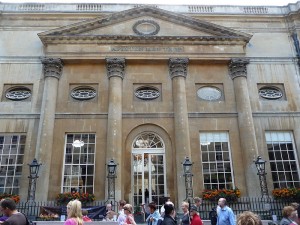This poem celebrates the victory of Hieron, ruler of Syracuse, in the single-horse race at the Olympic Games in 476BC. A number of Pindar’s victory odes were written for Sicilians, and the poet spent some time on the island in the 470s. These opening lines to the poem are typical of Pindar’s love of the metaphor, here in water, gold, fire, wealth, sun and rule.
Stephen Jenkin
ἄριστον μὲν ὕδωρ, ὁ δὲ χρυσὸς αἰθόμενον πῦρ
ἅτε διαπρέπει νυκτὶ μεγάνορος ἔξοχα πλούτου:
εἰ δ᾽ ἄεθλα γαρύεν
ἔλδεαι, φίλον ἦτορ, 5
μηκέθ᾽ ἁλίου σκόπει
ἄλλο θαλπνότερον ἐν ἁμέρᾳ φαεννὸν ἄστρον ἐρήμας δι᾽ αἰθέρος,
μηδ᾽ Ὀλυμπίας ἀγῶνα φέρτερον αὐδάσομεν:
ὅθεν ὁ πολύφατος ὕμνος ἀμφιβάλλεται
σοφῶν μητίεσσι, κελαδεῖν
Κρόνου παῖδ᾽ ἐς ἀφνεὰν ἱκομένους 10
μάκαιραν Ἱέρωνος ἑστίαν,
θεμιστεῖον ὃς ἀμφέπει σκᾶπτον ἐν πολυμάλῳ
Σικελίᾳ.
Water is best, while of all riches, gold, Str. 1
like fire in the dark, shines well apart.
But if it’s games, my heart,
you want to hymn, what star could you behold
more warm or more unrivalled in the air
than the bright sun,
or what contest compare
to Zeus’s at Olympia? Not one.
From that source, poems that all of us repeat
wing round the minds of wise men, who entreat 10
and offer praises up to Cronus’ son
at the rich and happy hearth of Hieron[.]
Translation by Chris Childers. Chris teaches at St. Andrew’s School in Delaware. He is currently at work on a verse translation of Greek and Latin Lyric Poetry from Archilochus to Martial for Penguin Classics. His full versions of Olympian 1 and Pythian 8 are forthcoming next week from Arion (on the web at www.bu.edu/arion or on Facebook at https://www.facebook.com/ArionBU).
The above text is provided by the Perseus Digital Library.
Read more of this text at the Perseus site.

The Pump Room at Bath where one can still ‘take the waters’ today, just as in Jane Austen’s day. It is built partly above the original Roman bath and temple complex. The inscription is the first three words of this Ode.
Teaching Ideas
The Cambridge Latin Course Book III is set in Bath, so many students will be interested in the inscription!
This first line is also a good example of μέν…δέ, which is introduced early on in most Greek courses, so the poem could be used to give a taster of the delights that await those who persevere.

No Comments